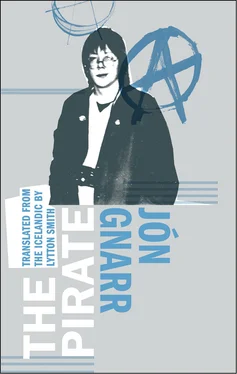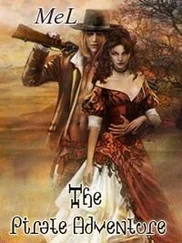“You write in English or Icelandic?”
I’d never considered this a particularly special thing for me and didn’t know how to answer.
“Just depends,” I said.
“You like singing in English?”
“It’s much better than singing in Icelandic.”
“Why?” he asked, curious.
“It always sounds so ridiculous.”
In my mind’s eye I saw all those ridiculous lyrics I’d tried to compose in Icelandic and the struggles I’d had getting translated lyrics to fit their tunes. The sentences were always too long or too short. I burst out laughing at the thought. I didn’t want to laugh but I couldn’t help it. The excitement and feeling of neurosis were too strong for me.
The program host smiled like he was trying to figure out what was so funny.
“Why ridiculous?”
“It makes you seem like an imbecile,” I said by way of explanation and giggled.
Now he started to laugh. I got the strong impression he wasn’t laughing with me but at me, like it was me who was being ridiculous, and I stopped laughing in an instant.
“It’s not possible to find the proper words…it just ends up in some kind of confusion,” I stammered, beginning to feel significantly ill.
“But is it a source of pleasure for you, messing around with language so that no one understands it?” he asked.
What did he mean now? What kind of question was that? Why didn’t he ask anything about punk or anarchism? What exactly was the man talking about? Didn’t he know how to interview? I looked awkwardly at the boys to see if they had an answer to this question. They clearly didn’t and were looking questioningly at me. I felt like I was going to explode. Was the interview turning into a disaster? Was the nation going to turn off their radios? I waited for my head to explode and my brains to splash across the studio walls.
“Huh?”
He repeated the question.
“Do you enjoy messing around with language so no one understands it? Perhaps you don’t understand it yourself, sometimes?”
“Yes and no,” I said, just to say something, although I still didn’t know what the man was getting at.
There was an awkward silence.
“But is there a meaning to your lyrics?”
Finally a question worth answering! Finally the guy had said something a person could understand.
“Yes, of course,” I answered, certainly.
“And who are you most trying to reach? Are you trying to reach out to your peers?”
What the fuck were these questions? What did he mean now? Were we trying to reach out to our peers? How would we reach them? Didn’t the man get that we were a punk band? There are no other real punk rock bands in Iceland. We were the first real punk band singing about anarchism. Reach out to our peers?
“The politicians,” said Hannes suddenly.
“The politicians?” asked the program host, just as startled as me.
I could not imagine that there were many politicians who’d bother to listen to us. Politicians? How did that pop into Hannes’s mind? We were playing for politicians? I seriously doubted it would be possible to find politicians who liked Nefrennsli, and I saw before me the guys my dad watched on TV. They were definitely not men who were into Nefrennsli.
“No, everyone,” I said.
“Everyone?”
“Yes.”
“Are you trying to influence the older generation at all?”
“We aren’t exactly expecting any interest from them,” I said.
Alli and Hannes joined in.
“The old crowd is finished,” Alli muttered.
“So no point talking about it?”
“No,” we responded unanimously.
“But what do your parents think? Do they enjoy this music?”
We all shook our heads. Mom and Dad had never heard of Nefrennsli and would surely not have enjoyed the music. I don’t think my mom would even classify this as music, and I doubted that my dad had any inkling in his head that I was in a band.
“Mom doesn’t care,” said Hannes.
The host soon realized that he wouldn’t get any interesting answers to this question, so he changed the subject.
“Do you work?” he asked next.
Do we work? What kind of question is that? Where was this topic headed? What did it really matter whether we were working or not? It was a totally frigging absurd question! He might as well ask us whether we had any living grandparents.
“We were in the youth employment program,” said Alli.
“Well, two of us were,” he added, looking at Hannes.
The radio host stared at me. It was clearly time for me to say something in this media interview. The nation sat tensely at their radios and waited.
“I was a carer for my sister,” I said.
Then silence. Maybe we were just too tough and cool for this guy. What did the old fellow know about punk? Clearly nothing! Asking about language and work wasn’t talking to someone. Why didn’t he ask us something about the song? Talk about how cool it was and how it was awesome that there was finally a real punk band in Iceland, a band comparable to the major UK punk bands.
“Well, guys…What can you tell me about this song we’re about to play?”
At last! The Icelandic nation would finally hear real Icelandic punk. This unbearable nightmare was finally complete.
“It’s called ‘Bad World,’” said Hannes.
“He wrote the song,” I said, pointing at Alli. “And I wrote the lyrics.”
“And do you think the world is evil?”
“Yes,” I answered with conviction.
“But surely it must be good when anyone can play without knowing a thing about musical instruments?” said the man, pleased with himself.
Again! Yet another absurd question about something unimportant. Was he simply asking this to confuse us? Was he intentionally trying to get us off balance by asking us questions we didn’t understand?
“Huh?” I said.
“Yes,” said Alli, at the same time.
“That’s totally good,” said Hannes.
We were losing control again. I made a last-ditch to save the interview. It was do or die.
“It’s not enough to play. You need someone to listen,” I said resolutely.
He turned away from us and poked at some buttons.
“Let’s just hope someone is listening. Thank you for coming, boys,” the host said finally and turned on the track.
Why is the world so bad
Or is it just that I’m so sad
We floated out of the radio station. We felt like rock stars as we walked around the city center. We all agreed, however, that the interview had not gone well. The old codger was an idiot and had only asked us questions that made no sense. But our song had been played. All the people had listened and heard the song. We all had high hopes that people would mob us in the city square at Lækjartorg and insist on autographs. But it was cold in the capital that evening, and people were apparently too busy hurrying home to the warm to notice the three punk rockers waiting — full of expectation and dressed lightly — for fame. Wearing T-shirts in the frost, hands in pockets and backs to the wall. Like the Sex Pistols with runny noses.
At that time, I tended to wander about a lot, around the city, both day and night, either on foot or by bus. That was how I came across Outreach, a project run by the city of Reykjavík and located on Tryggvagata. Outreach comprised adults who drove around town and looked out for down-on-their-luck teenagers like me. Several times over the years, they’d grabbed me up in their arms, hurried me to the shelter on Tryggvagata, jabbered at me, and even managed to drag me into various activities and resources. They were especially concerned to work out teenagers’ interests and would try to find assorted ways to enable kids to enjoy those interests. I had a few good times there. My main hobby was anarchism, so in my case it meant their resources mostly involved chatting with me about things related to anarchism. But they perceived more than I revealed and clearly saw that I was a tortured soul. I had become badly damaged due to all the bullying I’d suffered without being able to process it. I just felt I deserved it and, what’s more, it was completely understandable since I was stupid and boring, ugly and ridiculous. I was a ridiculous person, and of course people bully ridiculous people. The folk at Outreach were more interested in discussing that with me, and not anarchy.
Читать дальше











